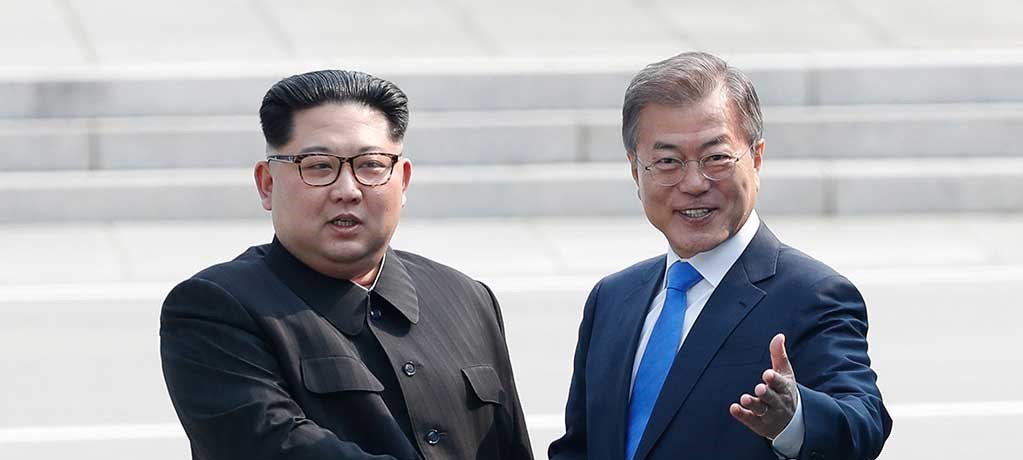The end of Korean war
April 28, 2018 | Expert Insights

After 65 years, the leaders of North and South Korea have announced that they have agreed to officially end the Korean War.
For the first time in over a decade, two heads of state from these nations met on April 27, 2018. North Korean leader Kim Jong Un and South Korean President Moon Jae In also announced the intent to completely denuclearize North Korea.
Background
North Korea is one of the most secretive nations in the world. The United Peninsula was occupied by Japan between 1910 and 1945. Towards the end of the World War II, Soviet troops advanced towards Korea to take over from the vanquished Japanese forces. The United States, which by then had begun to distrust the Soviets, requested them to stop their offensive. By 1948, the country was partitioned into North and South Korea. In 1950, North Korea supported by Chinese and Russian forces invaded South Korea. US forces along with the United Nations intervened on behalf of South Korea and the invading army was driven out. Though an armistice was signed in 1953, there has been no peace treaty signed to this day. Currently 28,500 American soldiers, sailors, airmen and marines form part of United States Forces Korea (USFK) in South Korea.
The fates of the two regions diverged in the decades that passed. South Korea embraced market economy and became one of the technologically advanced nations in the world. On the other hand, North Korea favored a totalitarian system that isolated itself from most of the world. It relied heavily on aid from China and Russia.
In 2018, the tide turned in the ties between the US and North Korea. It began with the North Korean leader announcing that he was willing to enter into diplomatic discussions with South Korea. Since then, the relationship between South Korea and North Korea exponentially improved. It has now been announced that Kim Jong Un and US President Donald Trump would meet sometime in May 2018.
Analysis
Despite poor relations, South Korea has sent across aid to North Korea in the past. This is due to the fact that the North Korean regime has often been marred by food shortages and famine. However, ever since North Korea conducted its fourth nuclear test, the aid was stopped. It should be noted that in 2017, North Korea test launched a number of intercontinental ballistic missiles (ICBM) and conducted its sixth nuclear test.
Recently, in a historic moment, North Korean leader Kim Jong Un and South Korean President Moon Jae-in met for the first time. This is the first time in over a decade that two heads of state from North and South Korea met. The two leaders shook hands at the demarcation line between North and South. During this historic meeting, after 65 years, the two countries also announced that 2018 will witness the end of the Korean war. The pair agreed to bring the two countries together and establish a "peace zone" on the contested border.
"The two leaders declare before our people of 80 million and the entire world there will be no more war on the Korean peninsula and a new age of peace has begun," the official declaration said.
The statement included promises to pursue military arms reduction, cease "hostile acts," turn their fortified border into a "peace zone," and seek multilateral talks with other countries, such as the United States.
The announcement was met with optimism from world leaders. US President Donald Trump took to Twitter to note, “KOREAN WAR TO END! The United States, and all of its GREAT people, should be very proud of what is now taking place in Korea!” Japan, which is often seen as an adversary of North Korea, also met the news with elation. “Today President Moon Jae-in and Chairman Kim Jong Un held earnest discussions about North Korea’s denuclearisation. I want to welcome that as a positive move toward comprehensive resolution of various issues concerning North Korea,” Japanese Prime Minister Shinzo Abe told reporters in Tokyo, according to AFP. “We strongly hope that North Korea will take concrete action through this meeting and a summit between the US and North Korea,” he added.
“This is very positive news,” President Vladimir Putin’s spokesman Dmitry Peskov told reporters. The Russian news agency Tass quoted him saying: “In this case we positively regard the meeting itself between the two Koreas’ leaders and the declared outcome of the negotiations.”
Cheng Xiaohe, an associate professor at the School of International Studies at Renmin University in Beijing noted, “The main characters are DPRK and South Korea. Today’s summit was a giant step to improving the relation between DPRK and South Korea.”
The announcement comes just weeks after Mike Pompeo (current US Secretary of State) met with North Korean authorities. He had held meetings to discuss the upcoming summit between President Trump and Kim Jong Un.
Assessment
Our assessment is that this visit and the announcement to end the Korean War is both symbolic and significant. After 65 years of hostilities, there will be peace on the Korean peninsula and families that were torn apart as a result of the war could be re-united in the near future. We believe Mike Pompeo has set the stage for this visit guaranteeing the North Koreans both regime continuity and assuring the peninsular security. The declaration has also noted that quadrilateral meetings will be held ahead of officially declaring peace between the Koreans, the US and China. Thus, China will ensure its interests are also met as a result of this development.
Read more: The Kim-Moon summit








Comments